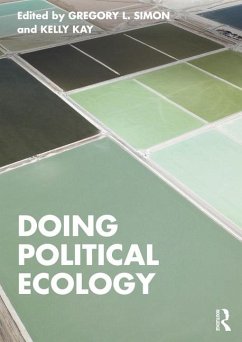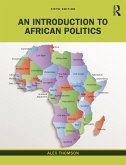Doing Political Ecology
Herausgeber: Simon, Gregory L.; Kay, Kelly
Doing Political Ecology
Herausgeber: Simon, Gregory L.; Kay, Kelly
- Broschiertes Buch
- Merkliste
- Auf die Merkliste
- Bewerten Bewerten
- Teilen
- Produkt teilen
- Produkterinnerung
- Produkterinnerung
Since its inception, the field of political ecology has served as a hub for inclusive and transformative environmental inquiry. Doing Political Ecology offers a distinctive entry point into this ever-growing field and argues that our scholarly â foundationsâ comprise a cross-cutting latticework of research approaches and concepts.
Andere Kunden interessierten sich auch für
![Slow Violence and the Environmentalism of the Poor Slow Violence and the Environmentalism of the Poor]() Rob NixonSlow Violence and the Environmentalism of the Poor22,99 €
Rob NixonSlow Violence and the Environmentalism of the Poor22,99 €![China, Africa, and the Future of the Internet China, Africa, and the Future of the Internet]() Dr Iginio Gagliardone (South Afric University of the WitwatersrandChina, Africa, and the Future of the Internet18,99 €
Dr Iginio Gagliardone (South Afric University of the WitwatersrandChina, Africa, and the Future of the Internet18,99 €![An Introduction to African Politics An Introduction to African Politics]() Alex Thomson (UK Coventry University)An Introduction to African Politics65,99 €
Alex Thomson (UK Coventry University)An Introduction to African Politics65,99 €![Routledge Handbook of Contemporary African Women Routledge Handbook of Contemporary African Women]() Routledge Handbook of Contemporary African Women218,99 €
Routledge Handbook of Contemporary African Women218,99 €![Reading Political Philosophy Reading Political Philosophy]() Derek MatraversReading Political Philosophy50,99 €
Derek MatraversReading Political Philosophy50,99 €![Agricultural Reform in Rwanda Agricultural Reform in Rwanda]() Chris HugginsAgricultural Reform in Rwanda33,99 €
Chris HugginsAgricultural Reform in Rwanda33,99 €![The Routledge Handbook of Democracy and Sustainability The Routledge Handbook of Democracy and Sustainability]() The Routledge Handbook of Democracy and Sustainability230,99 €
The Routledge Handbook of Democracy and Sustainability230,99 €-
-
-
Since its inception, the field of political ecology has served as a hub for inclusive and transformative environmental inquiry. Doing Political Ecology offers a distinctive entry point into this ever-growing field and argues that our scholarly â foundationsâ comprise a cross-cutting latticework of research approaches and concepts.
Produktdetails
- Produktdetails
- Verlag: Taylor & Francis Ltd
- Seitenzahl: 297
- Erscheinungstermin: 2. Oktober 2024
- Englisch
- Abmessung: 241mm x 174mm x 35mm
- Gewicht: 626g
- ISBN-13: 9780367760953
- ISBN-10: 0367760959
- Artikelnr.: 70289963
- Herstellerkennzeichnung
- Libri GmbH
- Europaallee 1
- 36244 Bad Hersfeld
- gpsr@libri.de
- Verlag: Taylor & Francis Ltd
- Seitenzahl: 297
- Erscheinungstermin: 2. Oktober 2024
- Englisch
- Abmessung: 241mm x 174mm x 35mm
- Gewicht: 626g
- ISBN-13: 9780367760953
- ISBN-10: 0367760959
- Artikelnr.: 70289963
- Herstellerkennzeichnung
- Libri GmbH
- Europaallee 1
- 36244 Bad Hersfeld
- gpsr@libri.de
Gregory L. Simon is a Professor in the Department of Geography and Environmental Sciences at the University of Colorado Denver. He has held positions at ETH Zurich, Stanford University, University of Colorado Boulder, and UCLA. His research examines the development and governance of social-environmental risks and vulnerabilities. Kelly Kay is an Associate Professor in the Department of Geography at the University of California, Los Angeles. She received her PhD from Clark University and has held academic appointments at UC Berkeley and The London School of Economics and Political Science. Her research is concerned with the political economy of the environment.
0.Introduction. Section I - Politicizing Environmental Management.
1.Sustaining Nature: Climate change and the catastrophe to come in
Kiribati. 2.Producing Nature: Where Biophysical Materialities Meet Social
Dynamics. 3.Contesting Nature: Nature as a field of power, difference and
resistance. Section II: Making Nature Knowable. 5.Narrating Nature:
Decolonizing Socio-Ecological Assemblages. 7.Valuing nature: Constructing
'value' and representing interests in environmental decision-making.
8.Enumerating Nature: Engaging Environmental Science and Data within
Critical Nature-Society Scholarship. Section III: Capital, Colonialism, and
Political Economy. 9.Globalizing Nature: Long-standing structures and
contemporary processes. 10.Monetizing Nature: From Resource-Making to
Financialization. 11.Protecting Nature: Political Ecologies of Conservation
through the lens of Peace Parks. 12.Degrading Nature: Production and the
Hidden Ecology of Capital. 13.Consuming nature: From the politics of
purchasing to the politics of ingestion. Section IV: Political Ecologies of
Identities, Difference and Justice. 14.Engaging Nature: Public Political
Ecology for Transformative Climate Justice. 15.Gendering Nature: From
Ecofeminism to Feminist Political Ecology. 16.Racializing nature: The Place
of Race in Environmental Imaginaries and Histories. 17.Embodying Nature:
De-centering and re-centering bodies as socio-nature. 18.Unruly Nature:
Non-human intractability and multispecies endurance.
1.Sustaining Nature: Climate change and the catastrophe to come in
Kiribati. 2.Producing Nature: Where Biophysical Materialities Meet Social
Dynamics. 3.Contesting Nature: Nature as a field of power, difference and
resistance. Section II: Making Nature Knowable. 5.Narrating Nature:
Decolonizing Socio-Ecological Assemblages. 7.Valuing nature: Constructing
'value' and representing interests in environmental decision-making.
8.Enumerating Nature: Engaging Environmental Science and Data within
Critical Nature-Society Scholarship. Section III: Capital, Colonialism, and
Political Economy. 9.Globalizing Nature: Long-standing structures and
contemporary processes. 10.Monetizing Nature: From Resource-Making to
Financialization. 11.Protecting Nature: Political Ecologies of Conservation
through the lens of Peace Parks. 12.Degrading Nature: Production and the
Hidden Ecology of Capital. 13.Consuming nature: From the politics of
purchasing to the politics of ingestion. Section IV: Political Ecologies of
Identities, Difference and Justice. 14.Engaging Nature: Public Political
Ecology for Transformative Climate Justice. 15.Gendering Nature: From
Ecofeminism to Feminist Political Ecology. 16.Racializing nature: The Place
of Race in Environmental Imaginaries and Histories. 17.Embodying Nature:
De-centering and re-centering bodies as socio-nature. 18.Unruly Nature:
Non-human intractability and multispecies endurance.
0.Introduction. Section I - Politicizing Environmental Management.
1.Sustaining Nature: Climate change and the catastrophe to come in
Kiribati. 2.Producing Nature: Where Biophysical Materialities Meet Social
Dynamics. 3.Contesting Nature: Nature as a field of power, difference and
resistance. Section II: Making Nature Knowable. 5.Narrating Nature:
Decolonizing Socio-Ecological Assemblages. 7.Valuing nature: Constructing
'value' and representing interests in environmental decision-making.
8.Enumerating Nature: Engaging Environmental Science and Data within
Critical Nature-Society Scholarship. Section III: Capital, Colonialism, and
Political Economy. 9.Globalizing Nature: Long-standing structures and
contemporary processes. 10.Monetizing Nature: From Resource-Making to
Financialization. 11.Protecting Nature: Political Ecologies of Conservation
through the lens of Peace Parks. 12.Degrading Nature: Production and the
Hidden Ecology of Capital. 13.Consuming nature: From the politics of
purchasing to the politics of ingestion. Section IV: Political Ecologies of
Identities, Difference and Justice. 14.Engaging Nature: Public Political
Ecology for Transformative Climate Justice. 15.Gendering Nature: From
Ecofeminism to Feminist Political Ecology. 16.Racializing nature: The Place
of Race in Environmental Imaginaries and Histories. 17.Embodying Nature:
De-centering and re-centering bodies as socio-nature. 18.Unruly Nature:
Non-human intractability and multispecies endurance.
1.Sustaining Nature: Climate change and the catastrophe to come in
Kiribati. 2.Producing Nature: Where Biophysical Materialities Meet Social
Dynamics. 3.Contesting Nature: Nature as a field of power, difference and
resistance. Section II: Making Nature Knowable. 5.Narrating Nature:
Decolonizing Socio-Ecological Assemblages. 7.Valuing nature: Constructing
'value' and representing interests in environmental decision-making.
8.Enumerating Nature: Engaging Environmental Science and Data within
Critical Nature-Society Scholarship. Section III: Capital, Colonialism, and
Political Economy. 9.Globalizing Nature: Long-standing structures and
contemporary processes. 10.Monetizing Nature: From Resource-Making to
Financialization. 11.Protecting Nature: Political Ecologies of Conservation
through the lens of Peace Parks. 12.Degrading Nature: Production and the
Hidden Ecology of Capital. 13.Consuming nature: From the politics of
purchasing to the politics of ingestion. Section IV: Political Ecologies of
Identities, Difference and Justice. 14.Engaging Nature: Public Political
Ecology for Transformative Climate Justice. 15.Gendering Nature: From
Ecofeminism to Feminist Political Ecology. 16.Racializing nature: The Place
of Race in Environmental Imaginaries and Histories. 17.Embodying Nature:
De-centering and re-centering bodies as socio-nature. 18.Unruly Nature:
Non-human intractability and multispecies endurance.








